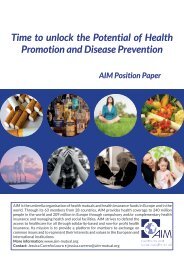Exploring patient participation in reducing health-care-related safety risks
Exploring patient participation in reducing health-care-related safety risks
Exploring patient participation in reducing health-care-related safety risks
Create successful ePaper yourself
Turn your PDF publications into a flip-book with our unique Google optimized e-Paper software.
<strong>Explor<strong>in</strong>g</strong> <strong>patient</strong> <strong>participation</strong> <strong>in</strong> reduc<strong>in</strong>g <strong>health</strong>-<strong>care</strong>-<strong>related</strong> <strong>safety</strong> <strong>risks</strong><br />
162<br />
ANNEX 5.<br />
DOCTOR QUESTIONNAIRE ABOUT<br />
MEDICATION SAFETY<br />
PATIENT SAFETY RIGHTS AND MEDICATION SAFETY<br />
WHO Patient Safety Rights Project<br />
The questionnaire <strong>in</strong>tends to describe whether safe medication practices are be<strong>in</strong>g used <strong>in</strong> everyday practice while<br />
prescrib<strong>in</strong>g the new medication and cont<strong>in</strong>u<strong>in</strong>g <strong>patient</strong> medic<strong>in</strong>e treatment. Please mark the appropriate choice for each<br />
of the questions below. This survey is anonymous and <strong>in</strong>formation obta<strong>in</strong>ed will be used solely for the purpose of this<br />
study. Please just <strong>in</strong>dicate your sex and age at the f<strong>in</strong>al page of questionnaire. Thank you for your <strong>in</strong>put and cooperation.<br />
1 Physician<br />
No specialty 1st degree specialist 2nd degree specialist (highest)<br />
2. Do you expect <strong>patient</strong>s to provide detailed <strong>in</strong>formation about recently taken medication at the first visit?<br />
YES NO<br />
3. Please describe which of the factors below are most important regard<strong>in</strong>g drug prescrib<strong>in</strong>g:<br />
A Patient age<br />
B Risk of <strong>in</strong>teraction<br />
C Risk of adverse events<br />
D Comorbidities that might affect medic<strong>in</strong>es outcomes<br />
4. Do you ask your <strong>patient</strong>s about the OTC drugs and/or dietary supplements they might be tak<strong>in</strong>g?<br />
YES NO<br />
5. Do you always ask your <strong>patient</strong>s about the names of medications they recently took?<br />
YES NO<br />
6. Have you treated a <strong>patient</strong>/<strong>patient</strong>s who have appo<strong>in</strong>tments due to adverse drug reaction to an<br />
OTC drug?<br />
YES NO<br />
7. Have you treated a <strong>patient</strong>/<strong>patient</strong>s who visit due to adverse drug reaction to a dietary supplement or<br />
herbal medic<strong>in</strong>es?<br />
YES NO<br />
8. Do you ask <strong>patient</strong>s about possible adverse drug reactions before prescrib<strong>in</strong>g new medication?<br />
NEVER ALWAYS SOMETIMES<br />
9. Do you reflect upon the possible undesired <strong>in</strong>teraction with medic<strong>in</strong>es already taken before prescrib<strong>in</strong>g<br />
a new drug?<br />
YES NO<br />
10. Please def<strong>in</strong>e the number of simultaneously taken medic<strong>in</strong>es for which the statistical risk of drug<br />
<strong>in</strong>teractions results <strong>in</strong> certa<strong>in</strong>ty.<br />
A 1–3 medications<br />
B 3–5 medications<br />
C 5–7 medications<br />
D More than 8 medications<br />
11. Do you expect the <strong>patient</strong> to have a list of their medication names and doses?<br />
YES NO<br />
12. In case of adverse drug reaction, do you report this to the designated authorities?<br />
13. SEX<br />
14. AGE<br />
NEVER ALWAYS SOMETIMES<br />
FEMALE MALE<br />
Years



